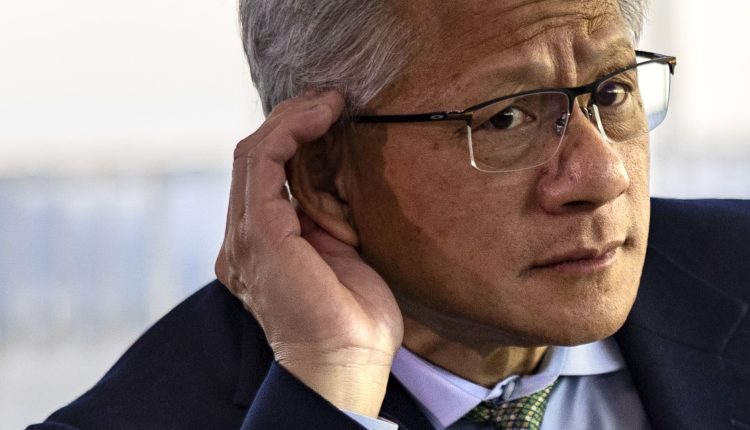Nvidia CEO Jensen Huang listens to a reporter’s question during a press conference at the APEC CEO Summit on October 31, 2025 in Gyeongju, South Korea.
Ezra Acayan | Getty Images News | Getty Images
Nvidia CEO Jensen Huang doesn’t accept national security concerns about his company selling its most advanced semiconductors to China, claiming collaboration is in everyone’s best interest.
Speaking to reporters in South Korea, Huang said he would continue to advocate for access to the Chinese market and was “optimistic” that the country will continue to want U.S. chips as it positions itself as a leader in AI.
“The Chinese market is a unique, vital, important and dynamic market that no one can replace,” he said.
“It is in America’s best interest to serve this Chinese market. It is in China’s best interest for the American technology company… to bring technology to the Chinese market… It is in the best interest of both countries, and I hope that policymakers will ultimately come to that conclusion.”
His comments come amid U.S. export restrictions that prevent Chinese companies from buying advanced semiconductors used in AI development.
President Donald Trump said Thursday that he discussed exporting Nvidia chips at the leaders’ meeting with Chinese President Xi Jinping, but the discussions did not cover the most advanced Blackwell graphics processors. “I said it’s really in between [China] and Nvidia, but we are kind of the referee,” Trump said after the meeting.
The US says its chip restrictions are aimed at both limiting China’s “access to the technologies and ability to produce advanced chips” and limiting its access to “related computing and AI applications.”
But Huang pointed out that these concerns are unfounded.
“China makes a lot of AI chips itself, and the Chinese military certainly has plenty of access to chips made in China. So regardless of the national security concerns, one has to consider the fact that China has blocked H20.” [an Nvidia chip] And so in many ways China is saying, “Listen, we have a lot of AI technology ourselves,” Huang told CNBC’s Eunice Yoon on Friday.
“From that perspective, I think the national security concern is actually answered by the fact that China doesn’t want H20 or any American chips.”
“It’s stupid to underestimate Huawei”
The Chinese telecommunications giant Huawei is also at the center of the technical tensions between the USA and China.
Federal use of Huawei products is banned in the US over fears they could be used by the Chinese government for espionage purposes, while US firms are also banned from doing business with the company. The bans went into effect during Trump’s first term.
Huang said Nvidia was “miles ahead” in the chip competition, but stressed: “It is foolish to underestimate the power of China and Huawei’s incredible competitive spirit.”
“This is a company with extraordinary technology. They dominate the world’s 5G telecommunications standards and technologies. They build amazing smartphones, they build amazing chips, they are incredible at networking, and when they announced CloudMatrix, I wasn’t surprised that they were able to create something so amazing,” Huang said, referring to Huawei’s large-scale AI supercomputing system.
“It’s deeply uninformed to think that Huawei can’t build systems. We take competition very seriously. We respect competition, we deeply respect China’s capabilities. That’s why we’re so fast and that’s why we’re dedicated to inventing the future so we can get there before anyone else,” he added.
— CNBC’s Eunice Yoon, Spencer Kimball and Arjun Kharpal contributed reporting.


Comments are closed, but trackbacks and pingbacks are open.